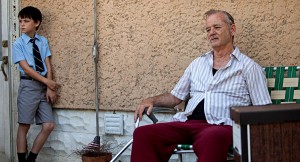 Vincent McKenna (Bill Murray) lives like a slob. He smokes, drinks, gambles, and curses too much. He’s rude to his neighbors and people in general. And he cavorts with a prostitute. Despite all these negative qualities, he is the title character in the film “St. Vincent,” written and directed by Theodore Melfi.
Vincent McKenna (Bill Murray) lives like a slob. He smokes, drinks, gambles, and curses too much. He’s rude to his neighbors and people in general. And he cavorts with a prostitute. Despite all these negative qualities, he is the title character in the film “St. Vincent,” written and directed by Theodore Melfi.
So what exactly is saintly about Vincent?
First off, consider this. There’s a book about actual canonized saints called “Saints Behaving Badly: The Cutthroats, Crooks, Trollops, Con Men, and Devil-Worshippers Who Became Saints” by Thomas Craughwell. There’s another book called “Fools, Liars, Cheaters, and Other Bible Heroes” by Barbara Hosbach.
The conclusion? Being a saint doesn’t mean you were never a sinner.
Vincent’s got the sinning thing down pretty good, but it takes a deeper look to find the potential saint within.
That potential is eventually spotted by Oliver (Jaeden Lieberher), the 12-year-old son of the newly divorced Maggie (Melissa McCarthy), both of whom move in next door to Vincent. They all begin their relationship on a sour note, but fate eventually forces them to become a part of each others’ lives.
 Maggie has to work a lot because her deadbeat ex refuses to pay child support, so when Oliver gets picked on and robbed by some bullies in his new Catholic school, he can’t get into his house because they stole his keys. Oliver’s got nowhere to go but Vincent’s place, where he then calls his mom. Vincent gets on the phone with Maggie and demands a babysitting fee to let Oliver stay with him until she gets home. She has no other options, so Vincent’s new job begins.
Maggie has to work a lot because her deadbeat ex refuses to pay child support, so when Oliver gets picked on and robbed by some bullies in his new Catholic school, he can’t get into his house because they stole his keys. Oliver’s got nowhere to go but Vincent’s place, where he then calls his mom. Vincent gets on the phone with Maggie and demands a babysitting fee to let Oliver stay with him until she gets home. She has no other options, so Vincent’s new job begins.
Though Vincent is a surly loner, you can tell Oliver grows on him. There’s a good-heartedness to the kid that touches him and allows him to care for another human being.
Oliver soon learns that there is someone else Vincent cares about: his wife Sandy, who is living in a nursing home due to Alzheimer’s. The tenderness and love with which Vincent interacts with Sandy is the antithesis of the persona he shows the world. Oliver sees it too and starts to realize that first impressions aren’t always right.
Of course, that doesn’t keep Vincent from indulging in his more colorful inclinations. He teaches Oliver how to bet on horses and also how to fight to defend himself. In other words, he becomes an imperfect father figure, but a father figure nonetheless.
When Oliver is given the school assignment to pay tribute to someone he considers a modern-day saint, he chooses Vincent. And though it may seem a stretch, that tribute becomes the emotional heart of the movie that will leave you nodding your head in agreement and maybe even tearing up a little.
Melfi has created a thoroughly entertaining story with just enough edge to make it acceptable to mainstream audiences who might cringe at the thought of seeing a heartwarming redemption story. And make no mistake, Vincent never loses his edge – though he becomes more open to the love of the makeshift family that comes to surround him.
Perhaps an unexpected member of that family is Daka (Naomi Watts), the prostitute I mentioned at the start of this review. Not only does she have a weekly “date” with Vincent, but she’s also pregnant when the movie begins. No one is quite sure if the baby is Vincent’s or not, yet he accepts her and her situation into his life. And he even cons the hospital into giving her a semi-free ultrasound.
You might not expect a prostitute character to care about the baby she’s carrying – especially when it prevents her from making money – but Daka displays an openness to the new life inside her and discovers a type of love she’s never experienced before.
On the Catholic front, I can’t think of any movies lately that have had as positive a portrayal of priests, Catholic schools, and the faith in general as “St. Vincent.” There’s no lack of people willing to share horror stories about Catholic school when they were growing up, but I have to say these stories were always foreign to me. The nuns and priests in my grammar school were decent, hard-working, good people.
 The same holds true for Melfi whose daughter attends a Catholic grammar school in Brooklyn. He was inspired to create this film after an assignment was given to her to write about an established saint and a contemporary one.
The same holds true for Melfi whose daughter attends a Catholic grammar school in Brooklyn. He was inspired to create this film after an assignment was given to her to write about an established saint and a contemporary one.
Melfi makes Oliver’s teacher – a priest played by Chris O’Dowd – a funny, self-deprecating, holy man that serves as a wonderful model of a priest. It was a refreshing change of pace to watch a story created by someone who has no ax to grind with the Church, but can instead appreciate its finer points and compassionate people.
Melissa McCarthy downplays her usual zaniness here to play a frazzled mom just trying to do the best she can – though she still manages to convey a bemusement at the people around her. Jaeden Lieberher perfectly inhabits his role as a small, slightly-nerdy pre-teen who is seeking a sense of belonging at school and in his personal life. Bill Murray, however, carries the story on his shoulders by adding dimension to a comically curmudgeonly character who is more than meets the eye.
So does Vincent actually achieve saintly holiness by the end of the film?
Consider this story from the Christopher News Note “From Sinners to Saints.” St. Callixtus, who died around 222 A.D., was originally an embezzler who lived in Rome. He came under the care and guidance of Pope St. Victor I who held him in check but also showed him kindness and genuine concern. This approach gradually led Callixtus to repentance for his sins, then to the priesthood and even the papacy. But before all that happened, someone had to have faith in him, to see the good in him.












